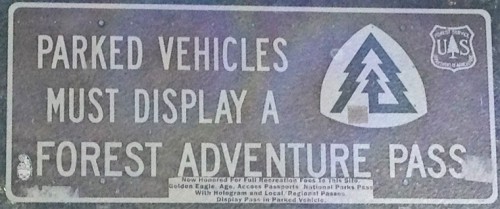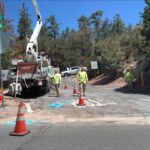
Editor’s note: This is the first in a series of articles regarding the U.S. Forest Service’s Adventure Pass and where and when it is required to be purchased and displayed.
The U.S. Forest Service says it still requires cars parked at Humber Park to display an Adventure Pass or equivalent pass. This, despite a February 2012 ruling from the federal 9th Circuit Court of Appeals (which includes California) and an April 2014 ruling from U.S. District Judge Terry J. Hatter Jr., Central District of California (which includes the San Bernardino National Forest), both rulings to the effect that the Forest Service may not charge a fee for parking without using facilities or services at a park.
The court rulings did not “outlaw” Adventure Passes; they are still required of persons who use facilities and services in Humber Park. But persons who only park their cars to go sightseeing, including hiking (applicable to both the Ernie Maxwell or Devil’s Slide Trails), or who engage in roadside or trailside picnicking, are not required to obtain Adventure Passes, ruled the courts.
The courts’ rulings are based on findings that the Federal Lands Recreation Enhancement Act specifically prohibits the Forest Service from charging fees
“[s]olely for parking, undesignated parking, or picnicking along roads or trailsides,” or for hiking through a park “without using facilities and services.” (16 U.S.C. § 6802(d)(1)(A), (D) & (E).)
The 9th Circuit held, “It is clear that the Forest Service cannot charge a fee from someone who does nothing other than park. … [¶] It is equally clear that the REA prohibits the Forest Service from charging standard amenity recreation fees for each of several activities in which … [persons] participate after they park: hiking without using facilities and services, picnicking on a road or trailside, or camping at a site that does not have a majority of the nine enumerated amenities.” (Adams v. United States Forest Service (2012) 671 F.3d 1138, 1145.)
Judge Hatter relied upon the REA and the Adams decision in his similar ruling in Fragosa v. U.S. Forest Service, which ruling applies to the San Bernardino National Forest.
Yet three years after the 9th Circuit’s ruling in Adams and a year and a half after Judge Hatter’s ruling in Fragosa, the Forest Service still maintains signage at Humber Park informing motorists that “parked vehicles must display a forest Adventure Pass” or an equivalent pass. [For example, the Forest Service’s Interagency Senior Pass (for sale to anyone age 62 or over for the lifetime fee of $10) may be displayed on a vehicle’s dashboard in lieu of an Adventure Pass.]
This writer has witnessed personnel at the Idyllwild office of the U.S. Forest Service informing visitors that they will need to purchase and display an Adventure Pass if they park at Humber Park just to hike the Devil’s Slide or Ernie Maxwell trails. They then sold Adventure Passes to those visitors.
Adding to the confusion, the 20-page San Bernardino National Forest Visitor Guide for 2014-15, which is currently being distributed at the Idyllwild Forest Service office, states on page 18 that an Adventure Pass is required when a vehicle is parked in certain “Designated Sites,” which, it says, are specifically listed in a box on the same page. But Humber Park is not so listed. Further, page 18 of that same publication also states that an Adventure Pass is not required for “incidental activities” such as stopping to take a photograph, visiting a developed overlook or — [oddly enough] — “using a restroom.”
But the Town Crier was informed by David Cruz, customer service representative at the San Bernardino offices of the Forest Service, that an Adventure Pass is required just to park at Humber Park. He asserted that the court rulings referred to above do not hold otherwise.
In an effort to understand this situation, the Town Crier contacted attorney Matt Kenna of Public Interest Environmental Law in Durango, Colorado. Kenna was the lead attorney representing the plaintiffs in both the Adams case and the Fragosa case, referenced above. Kenna related that the Fragosa judgment in favor of the plaintiffs was appealed by the Forest Service and that the matter may now possibly settle on appeal.
Kenna stated that he was not at liberty to discuss the terms of the settlement, so he related nothing about it. [This writer’s best guess is that the parties may be reaching an agreement regarding detailed interpretations within the confines of the Adams and Fragosa rulings as they apply to various situations persons may encounter at Forest Service-controlled facilities.]
The Town Crier will monitor this situation and report on further developments in future articles in this Adventure Pass series.










